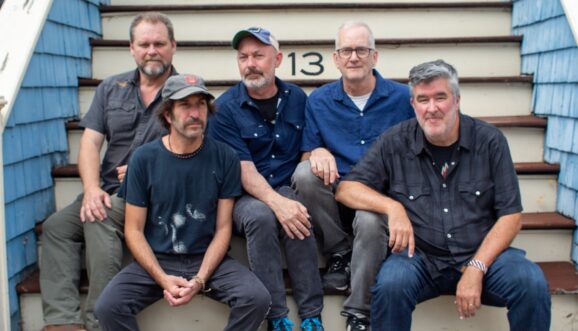Released over a half-century ago, Jefferson Airplane’s first live album, Bless Its Pointed Little Head, (released February 1969) offers a stark contrast to its studio predecessor Crown of Creation. The latter release of 1968 carried more folk overtones than the psychedelic expedition it followed, After Bathing At Baxter’s, though hardly so many as the effort preceding that LP, Surrealistic Pillow.
Containing “White Rabbit” and “Somebody to Love,” the two hit singles that turned the tongue-in-cheek moniker of Jefferson Airplane into a household name (not to mention ostensible flag-bearers of the hippie movement), the polite folk-rock tendencies of the sophomore JA studio album bear little resemblance to the often driven collection of concert culls from shows at Fillmore East and West.
Certainly, there’s some overlap in material, but on this take of the late Fred Neil’s “The Other Side of This Life,” the band’s intensity far outstrips that of its counterpart. By and large, there’s a similarly loose, raw atmosphere emanating from these stage selections rather than the precision of the studio recordings the Grateful Dead’s Jerry Garcia helped fashion on the 1967 album: included on a 2004 expanded CD remaster, vocalist Marty Balin’s heartbreaking “Today” is taut, almost to breaking point.
As such, it’s indicative of the latter founding member’s diminishing presence within the group. Lead singer/songwriter Grace Slick’s prominence rose exponentially with her lead vocals on both the aforementioned hit singles, while two other bonus cuts, “Watch Her Ride” and “Saturday Afternoon”/Won’t You Try” hint at rhythm guitarist/vocalist Paul Kantner’s rise to eminence within the group: the ragged mesh of his voice with Slick’s and Balin’s also exemplified the liberating sense of personal freedom(s) so indicative of the counterculture the Airplane personified.
The band’s limited adherence to tradition lay in the hands of guitarist Jorma Kaudonen and, only to a slightly lesser extent, those of bassist Jack Casady. This duo founded their offshoot Hot Tuna in 1969, relying to a great extent on blues material comparable to the “Rock Me Baby” they lead here. Nonetheless, drummer Spencer Dryden’s fierce drum work lends power to this cut Tuna would not achieve til the so-called ‘metal years’ of its career in the late Seventies.
And a wholly different kind of improvisational force grew out of the moody eleven minutes here titled “Bear Melt.” Ostensibly an anti-game hunting screed, its alternately haunting and frantic air is as pointed in its caustic way as this cover of Donovan’s “Fat Angel” is delicate (and rightly so as a homage to the Mamas and Papas’ Cass Elliot).
With a running time of a little over fifty minutes, Bless Its Pointed Little Head barely fit on two sides of vinyl at the time of its release fifty-five years ago (and may account for the lack of definition in the audio mix so apparent on the remastered CD). Given the commercial success of Jefferson Airplane, it seems mysterious in retrospect that RCA Records would not deign to allow a double live album, but such releases had not yet become de rigueur.
Besides, the band had to some degree alienated the label by that time. Its prolonged studio sessions for Baxter’s inordinately delayed the release of that record, so that it could not fully capitalize on the group’s burgeoning fame during the ‘Summer of Love,” while the cover art of a mushroom cloud adorning the cover of its successor became a point of contention too.
In that light, it’s hard not to think the band was tendering some riposte to the bureaucracy for which they worked via the comical shot of Casady on this black & white front cover, not to mention manager Bill Thompson’s goofy art on an album insert. A rapprochement between the two parties nevertheless allowed for the establishment of Grunt Record in 1970; originally conceived as a home for new recording artists, it ended up as the repository for latter-day Airplane and Tuna-related titles.
In hindsight, however, the more than hour-long aforementioned reissue of Bless Its Pointed Little Head, along with the belated release of the Airplane’s extended set at the Woodstock Festival, capture the heady spontaneity that distinguished the ensemble from most of their Sixties peers as the decade came to a close.
The final studio effort of this classic lineup, Volunteers, posited a band just barely greater than the sum of its parts when it came out later in ’69, however, it’s little wonder that, roughly a year after the release of the live album, JA would be heading for what, in the hindsight of five and a half decades, was an inexorable dissolution.
1971’s Bark found the lineup missing both Balin and Dryden, while one of Kaukonen’s four original contributions, “Third Week in the Chelsea,” spoke directly about his growing disenchantment with JA operations. The group eventually morphed into the much more accessible Jefferson Starship–sans that aforementioned song’s author as well as Casady–that unit’s across-the-board success ironically shepherded along by the mainstream commerciality of Marty’s “Miracles” as featured on its 1975 album Red Octopus.









